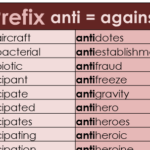Words That Start With Anti-
1. Antidote
2. Antisocial
3. Antifreeze
4. Antimicrobial
5. Antibacterial
6. Antidepressant
7. Antioxidant
8. Antivenom
9. Anticlimactic
10. Antithesis
11. Antipathy
12. Antitoxin
13. Antiracist
14. Antipyretic
15. Antiseptic
16. Antihistamine
17. Antitrust
18. Antislavery
19. Antifungal
20. Antiretroviral
21. Antipersonnel
22. Anticolonial
23. Antidiscrimination
24. Antinausea
25. Antimatter
26. Antigen
27. Anticorruption
28. Antifascist
29. Antiarthritis
30. Antiepileptic
More About Words That Start With Anti-
Title: Unveiling the Power of Words: Exploring the Rich Vocabulary of Words Beginning with “Anti-”
Introduction:
Language is undeniably one of the most vital aspects of human communication, enabling us to convey thoughts, emotions, and ideas across generations and cultures. Within the vast realm of words, we often stumble upon linguistic treasures that hold the power to evoke strong sentiments or initiate intriguing discussions. Today, we embark on a lexical journey, exploring the intriguing world of words beginning with “anti-.”
The prefix “anti-” stems from the Greek word “antí,” meaning “against” or “opposed to.” It serves as a linguistic gateway, assembling a diverse array of words that showcase the human capability to express resistance, opposition, or negation. Words that bear this distinctive prefix carry a rich history, culture, and significance, shaping our understanding of the world around us.
As we delve deeper into this unique linguistic realm, we will encounter an assortment of words associated with various disciplines, from medicine and politics to social issues and technology. The prefix “anti-” adds a layer of complexity by underscoring different forms of opposition or negation within each domain. By exploring these words, we can uncover the nuances they bring to our expressions and enrich our understanding of the human experience.
In the realm of medicine and biology, words such as “antibacterial,” “antiviral,” or “antioxidant” spring to mind. These words hint at the formidable arsenal of protective measures that humans have discovered to combat harmful microorganisms, infections, and self-destructive molecules. In a world where health and well-being are paramount, understanding the implications behind these “anti-” words becomes a vital tool for everyone.
Beyond the realm of science, the prefix “anti-” settles comfortably in the political arena, leaving a lasting impact on discussions of ideology and governance. Words like “anti-authoritarian,” “anti-establishment,” or “anti-globalization” highlight dissent, protests, or movements that challenge existing power structures. These words reflect the dynamic nature of society, capturing the essence of resistance and pushing for change.
In the social context, the prefix “anti-” plays a crucial role in addressing societal issues and inequities. Words like “antidiscrimination,” “anti-racism,” or “anti-sexism” bring to light the ongoing struggle for equality and justice. These words serve as a beacon of hope, fostering conversations and actions that aim to dismantle oppressive systems, promoting inclusivity and understanding.
Stepping into the realm of technology, the prefix “anti-” adorns words that speak to our constant quest for security and protection. Terms like “antivirus,” “anti-hacking,” or “anti-spam” underline our battle against malicious intent on the digital frontier. In a rapidly evolving digital landscape, these words remind us of the importance of safeguarding our online presence and preserving our privacy.
In conclusion, the rich tapestry of words commencing with “anti-” grants us a comprehensive insight into the multifaceted nature of human expression. From the realms of medicine and politics to social justice and technology, these words encapsulate our resistance, opposition, and negation, fueling change and challenging our understanding of the world.
As we continue to explore the power and beauty of language, examining words beginning with “anti-” allows us to uncover the layers of dialogue embedded within our shared vocabulary. By embracing the richness of these words, we can nourish our collective consciousness, fostering compassion, empathy, and the desire for positive transformation.
So, embark on this linguistic journey with an open mind and let the words beginning with “anti-” ignite your curiosity, empowering your ability to engage in meaningful conversations and contribute to a more enlightened society.
Words That Start With Anti- FAQs:
1. Q: What does the prefix “anti-” mean?
A: The prefix “anti-” means against or opposite.
2. Q: What are some common words that start with “anti-“?
A: Some common words that start with “anti-” include antiseptic, antibiotic, antifreeze, antiviral, and anticolonial.
3. Q: How does an antiseptic work?
A: Antiseptics are substances that are applied to living tissues to prevent infection. They work by killing or inhibiting the growth of microorganisms.
4. Q: What is the purpose of antibiotics?
A: Antibiotics are drugs used to treat bacterial infections. They work by either killing the bacteria or stopping their growth.
5. Q: How does antifreeze work in a vehicle?
A: Antifreeze is a liquid added to a vehicle’s cooling system to lower the freezing point and prevent it from freezing in cold temperatures.
6. Q: What is an antiviral medication used for?
A: Antiviral medications are drugs used to treat viral infections. They work by suppressing the replication of viruses and inhibiting their ability to infect cells.
7. Q: What is the meaning of anticolonialism?
A: Anticolonialism refers to the opposition or resistance to colonialism, which is the domination and control by one country over another.
8. Q: Are there any negative implications of using antibacterial products excessively?
A: Excessive use of antibacterial products may contribute to antibiotic resistance and disrupt the balance of bacteria in our environment and bodies.
9. Q: What are some potential side effects of taking antipsychotic medications?
A: Potential side effects of antipsychotic medications may include drowsiness, weight gain, movement disorders, and metabolic changes.
10. Q: Can you provide an example of a word that starts with “anti-” and has a positive connotation?
A: One example is “anticipation,” which refers to the act of looking forward to something or having excitement or enthusiasm about future events.















